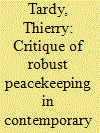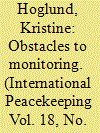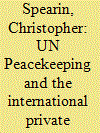|
|
|
Sort Order |
|
|
|
Items / Page
|
|
|
|
|
|
|
| Srl | Item |
| 1 |
ID:
103217


|
|
|
|
|
| Publication |
2011.
|
| Summary/Abstract |
The concept of robust peacekeeping emerged in response to the failures of the UN in Rwanda and Bosnia and Herzegovina, where peacekeepers were passive witnesses of massive violations to human rights, allegedly because they were not 'robust enough'. Although robust peacekeeping is not a new concept and has been partially implemented in some operations (Sierra Leone, Democratic Republic of Congo, Haiti, Lebanon), it attracted renewed attention in 2008-10 with developments in its conceptualization. While it recognizes the necessity and virtue of a robust approach as a protection mechanism for peacekeepers, this article questions the extent to which robust peacekeeping is politically acceptable and operationally viable. Beyond the doctrinal difficulty of ensuring compatibility of robustness with the principles of peace operations, robust peacekeeping is directly challenged by the perennial constraints of contemporary peace operations, such as weak political support, the erratic availability and quality of troops, and the reticence of troop contributors to embrace a robust approach. Overall, while robustness is presented as a solution to the 'credibility gap' that the UN faces, its relevance in the light of these problems is dubious.
|
|
|
|
|
|
|
|
|
|
|
|
|
|
|
|
| 2 |
ID:
103216


|
|
|
|
|
| Publication |
2011.
|
| Summary/Abstract |
When political actors and international relations scholars invoke 'the international community', the term is commonly framed very loosely. It is used either as a reference to the norms of international politics or, according to its composition, as a coalition of concerned actors. This article, by contrast, argues that it is the interplay of image and practice of the term's invocation that shapes its multi-faceted character. 'The international community' can be used by many different groups, state and non-state alike, to locate their political goals in the context of a wider array of values. Usually, these norms are state related and can be used to simulate political relevance. Conversely, actors defying widely accepted values can be excluded and policy against them legitimized. Addressing domestic as well as international audiences, the claim to be acting as, or on behalf of, 'the international community' is mostly virtual but has definite political consequences.
|
|
|
|
|
|
|
|
|
|
|
|
|
|
|
|
| 3 |
ID:
103218


|
|
|
|
|
| Publication |
2011.
|
| Summary/Abstract |
Consent to UN peacekeeping has faced powerful challenges. Host governments have either called for premature withdrawal of missions or so obstructed operations that fulfilling mandates became almost impossible. This article argues that strategies for managing deteriorating consent can be devised from relational contract theory. That theory envisages peace agreements as embodying a dynamic set of relationships among multiple actors, not only the signatories to the agreement but all stakeholders in a peace process. Original consent to the agreement - and to a peace operation deployed to support its implementation - matters, but the terms of the agreement should be understood as also encompassing the shared expectations that emerge from the ongoing relationship and the normative context in which it is embedded. The effective management of consent must account for that as well as the peacekeeping operation's own evolving relationship with the relevant actors, both internal and external.
|
|
|
|
|
|
|
|
|
|
|
|
|
|
|
|
| 4 |
ID:
103222


|
|
|
|
|
| Publication |
2011.
|
| Summary/Abstract |
This article addresses the ways in which linking a civilian monitoring mission with a mediator influences the work of that mission. It analyses how the Sri Lanka Monitoring Mission (SLMM) - deployed in order to oversee the results of the 2002 ceasefire agreement (CFA) - was influenced by Norway's dual role as a monitor and mediator. Did the dual role conflict with or strengthen the SLMM's work? This question is explored from the point of view of the monitors who served in the SLMM, based on new and unique empirical material from a survey and in-depth interviews with SLMM personnel. It highlights the confusion of roles between the monitors and the facilitators, which impeded the fulfilment of the monitors' task. The article also suggests avenues for future research relating to the development of third-party media strategies as well as considerations about the organizational arrangements both within and between third parties.
|
|
|
|
|
|
|
|
|
|
|
|
|
|
|
|
| 5 |
ID:
103219


|
|
|
|
|
| Publication |
2011.
|
| Summary/Abstract |
Civilian police have become such a sought-after commodity for use in peace support operations that the phrase 'international police peacekeeping' is now in common usage in the UN Department of Peacekeeping Operations. The nomenclature is, however, rather misleading, as police personnel may now be tasked with peace enforcement and peacebuilding tasks in addition to more traditional peacekeeping roles. Police personnel bring new capabilities and skill sets to bear in peace operations, and operational difficulties regarding quantity, quality and standardization are beginning to be addressed. However, concerns over the relevance of current policing models to post-conflict settings suggest that future international policing efforts would benefit from a closer consideration of how to balance the demands of international and local policing norms.
|
|
|
|
|
|
|
|
|
|
|
|
|
|
|
|
| 6 |
ID:
103221


|
|
|
|
|
| Publication |
2011.
|
| Summary/Abstract |
UN peacekeeping continues to confront qualitative and quantitative difficulties. Arguments in favour of using private military and security companies (PMSCs), particularly those referring to the 1990s-era when Executive Outcomes was operating, have been aired. The article examines earlier operational arguments for PMSC participation in UN peacekeeping, which at times have been reintroduced in more recent assertions: (1) PMSCs have better organization, training, and equipment; (2) they have a heightened willingness to apply force to serve UN mandates; and (3) they enjoy enhanced readiness to respond. The article argues, however, that it would be difficult for contemporary PMSCs to respond effectively, quickly, and robustly should the UN turn to them for enforcement operations. State and market pressures have conditioned PMSCs to operate in a manner dissimilar to that in the 1990s.
|
|
|
|
|
|
|
|
|
|
|
|
|
|
|
|
|
|
|
|
|